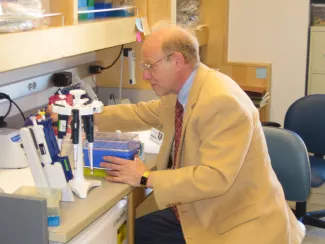Research

Researchers in the lab are focused on identifying lesions associated with the tumorigenesis and metastasis. The Surgical Oncology Tumor Bank has been invaluable in advancing this research possible. For example, the lab was able to help validate the role of microRNAs in a mouse model of pancreatic neuroendocrine tumors using human neuroendocrine tumor specimens. The lab is also investigating the role of Sall2 in conferring resistance to cancer therapies, how TNFR1 signaling contributes to the inflammatory response and cell apoptosis, and the role of colon cancer stem cells in perpetuating tumor growth.
Tumor suppressor proteins are the brakes that impede the deregulated and inappropriate cell growth found in cancer. Under the leadership of Dr. Warren, members of the Surgical Oncology Research Laboratory have been scanning the genome of human metastatic colon cancer
... Read More
The Surgical Oncology tissue bank is a repository for patient tumor specimens and matched normal tissue accumulated by UCSF surgeon-scientists Robert Warren and Eric Nakakura These specimens can be matched to clinical outcomes and the genes encoding important tumor suppressors
... Read More
Drs. Pincheira, Donner, and Warren have identified a novel factor called Sall2 that binds cell surface receptors for nerve growth factor. Sall2 appears to act at the cell surface to coordinate the activities of the nerve growth factor receptors and
... Read More
By implanting human tumors into mice, UCSF researchers have also isolated what we believe are colon cancer stem cells. These are cells which have properties similar to adult human stem cells, such as the capacity for self-renewal and the ability
... Read More
Signaling through receptors that contain cytoplasmic death domains can induce cancers to regress or in some instances may paradoxically promote the growth and spread of malignancies. The decision-making that underlies whether cancer cells can be induced to self-destruct in response
... Read More
Neuroendocrine (NE), or carcinoid, tumors of the GI tract frequently metastasize. Surgery is often not possible for patients with advanced disease, and current therapies are ineffective for shrinking tumors and durable palliation of debilitating symptoms. Our lab and others have
... Read More
The Surgical Oncology Tumor Bank contains tissue samples from more than 500 individual tumors that the lab has examined and catalogued, as well as a database of related information. By analyzing the growing body of data, we hope to identify
... Read More
